When people find out that I deal with swimming pools on a daily basis, one of the most common questions I get is, “What do you think about salt pools?” to which I find myself going into a little sales blurb on what a salt pool is. I would say 90% of the people have heard of salt pools, but don’t really know how they work. Most know they are supposed to be nicer than chlorine pools and think that salt pools don’t use chlorine, but this is not the case. This article will explain how a salt pool works, if one is the right choice for you and then the process of converting your pool from traditional chlorine to salt.
What is a salt water pool?
With a salt pool, you add salt to your pool water. This amount is below the taste threshold meaning you don’t taste a strong salt taste like associated with the ocean. Ocean water is at 50,000 parts per million (PPM) of salt. A salt pool is a mere fraction of this and only has 3,000 PPM of salt. In a salt pool an electrode (also called a salt cell) is installed in your plumbing and as the diluted salt water passes through the cell, the electrical reaction between the electrode and the salt water creates chlorine. So, with a salt pool you are still using chlorine to sanitize your pool as you are just manufacturing your own. The chlorine that is produced by a salt pool is a higher quality of chlorine that does not have the negative effects of traditional chlorine like the chlorine smell, red eyes and itchy skin. With a salt pool you no longer need to purchase chlorine tablets, liquid chlorine or shock as the salt system will be creating all of your chlorine. Salt systems also have a superchlorination feature that acts as shocking your pool. If you’re interested in learning more about salt water pools then I would suggest reading our recent blog post on “What is a Salt Water Pool” which goes into much greater detail on this topic.
The pros & cons of salt pools
Pros:
- No more buying chlorine – A salt system manufactures natural chlorine. That means no more buying chlorine tablets, shock or liquid chlorine!
- No more manually adding chlorine – On a salt system you dial in your chlorine production and that is it. This is a major benefit over traditional chlorine where you have to make sure to add your chlorine to the pool each week and if you forget or go on vacation then you are faced with issues. I have to admit this is my favorite benefit of a salt pool.
- No chlorine smell, red eyes or itchy skin – The negative effects of chlorine like the chlorine smell, red eyes and itchy skin are all due to chloramines. The chlorine that is produced by a salt pool does not have chloramines. This means all of these traditional side effects of chlorine are eliminated. This is the reason why many people who swim in a salt pool think that it is a non-chlorine pool.
Cons:
- High pH & calcium build-up – In salt pools the pH level of the water likes to rise. If you don’t keep your pH levels in check then this can lead to calcium scaling in your pool or your salt cell. This is easily maintained by testing your pH levels weekly and adding muriatic acid if you need to lower your pH.
- Salt cell replacement – Every 3-7 years you will need to replace your salt cell which costs between $200 – $700.
- More parts – On a salt system there are more parts which can become faulty like the circuit board, salt cell, flow sensor or flow switch.
- Corrosive to pool and equipment? – This topic is open for debate as many pool professionals feel salt water is perfectly fine for your equipment and others feel you need special equipment. Our experience is that sometimes the shaft seal on your pool pump may fail a little quicker, but this is an easy inexpensive fix. If you are adding a heater to your pool you may consider a cupro nickel heater as this heater has a heavy duty heat exchanger which is supposed to hold up better to salt. The last item you may consider is a sacrificial zinc anode. You place this zinc disk in your skimmer and the anode absorbs all the corrosion
Converting from chlorine to salt
Once you have made the decision that you want to convert from a traditional chlorine pool to a salt pool then your first decision will be which salt system to choose. A few considerations you will want to take into account when selecting your salt system are listed below.
Selecting your salt system
- Pool size: Salt systems range from pools 10,000 gallons – 100,000 gallons. You will need to select the system based on your pool size. You can always go with a larger unit on a smaller pool. This will allow you to run the salt system for shorter periods of time and you will have longer time between replacing your salt cell.
- Budget: Salt Systems can cost anything from $500 – $2,000. The less expensive models have few bells and whistles where the higher end systems have a bunch of fancy features including the ability to control all your pool equipment.
- Features: Salt systems vary in regards to the features offered. Some of these features include: salt readout, self cleaning, self diagnostics, digital readout and the ability to control pool equipment.
- Replacement cell cost: This is an important factor and is often overlooked. Your salt cell will need to be replaced every 3-5 years. Replacement salt cells range from $200 – $700. So, if you get a salt system which uses a $200 cell then you could replace this cell 3½ times before it costs as much as replacing the $700 cell.
- Where to buy: Here you can check out our full line Salt Chlorine Generators we even have a model for in-ground pools starting at $499.
Installation
Now it is time to decide if you are going to hire a pool company to install the salt system or do it yourself. If you go the pool company route, then you are looking at $300 – $500 for installation. Many homeowners decide to tackle this DIY project themselves as this is usually a 3-6 hour job that can be tackled over the weekend. We have put together a step-by-step video on “How to Install a Salt Chlorine Generator” which would be a good primer to see if you think you can tackle the job. The installation consists of some basic plumbing and electrical work.
Adding the salt
After you have installed your salt system the next step is to add the salt to your pool. We have put together a guide on “How to Add Salt to a Pool“ which discusses this process in greater detail, but we will touch on the basics which are:
- How much salt do you need?
- Testing water
- Selecting salt
- Adding salt
The first thing you will want to do is check the owner’s manual to determine how much salt you will need. Normally this will be between 400 lbs. – 1,000 lbs. based on the size of your pool. You will want to pick up some pool salt test strips as you don’t want to assume that you are starting at 0 PPM of salt as often your water will have some salt in it (for example you may be starting off at 200 PPM of salt). The salt strip will also be used after you add all of your salt to ensure you are within the 3,000 – 3,5000 PPM salt range.
Next you will need to pick up some pool salt. This can be easily found at your local home improvement store, pool store or even grocery store. You will just want to make sure the salt you choose is at least 99.8% NaCl and that it is granular (no pellets or rock salt). Often people get concerned when they hear that they need to add 400 lbs. of salt, but this is just 10 bags of salt (40 lb. bags) and salt costs about $5 per bag so this would be about $50 in salt. Salt does not dissolve from water meaning that you will only need to add additional salt if you experience evaporation, heavy rain, water being splashed out of the pool or a leak. Normally you would add several bags of salt throughout the year to maintain the required salt levels.
Now it is time to add the salt to your pool. Your pool pump should be turned on and the salt system should be turned off. You will want to broadcast the salt evenly around the pool for even distribution. Avoid adding the salt directly to the skimmer or main drains at the bottom of the pool as this can damage your equipment. You will run your filter pump for 24 hours to allow for the salt to mix evenly through your pool water. After 24 hours use your salt test strip to verify that you have the correct salt reading of 3,000 – 3,500 PPM of salt.
Starting up the salt chlorine generator
It is very important to start off with good pool water. Your water chemistry should start off at the following values:
Salt: 3,000 – 3,500 PPM
Free Chlorine: 1.0 – 3.0 PPM
pH: 7.2 – 7.8
Cyanuric Acid (Stabilizer): 50 – 75 PPM
Total Alkalinity: 80 – 120 PPM
Calcium Hardness: 150 – 400 PPM
At start up it is best to shock your pool from an outside source like a standard granular pool shock. Then, wait until the chlorine level has returned to between 1 to 3 PPM before turning on the salt system. Now it’s time to kick on your salt system. We suggest setting the system to 50% chlorine production and let the system run for 24 hours. After 24 hours test your pool water with a good test strip to see if your free chlorine is between 1-3 PPM. If your chlorine is too high or too low, dial your chlorine product up or down in 10% increments and retest your chlorine in 24 hours. Repeat this process until the proper chlorine level is reached. The nice thing is that once the salt system is dialed in it is pretty much a set-it-and-forget system, because it is always there producing natural chlorine for your pool at the desired amount to keep your pool crystal clear. Salt systems also have a superchlorinate feature which shocks your pool. So if you ever run into demanding water conditions then this feature comes in handy to shock your pool and get your pool water looking clear again.
Maintenance
Testing your water
Now that you have your salt system up and running you will want to periodically test your water to make sure that your water chemistry is in balance with the values listed earlier in this article.
Prolonging the life of your salt cell
Salt cells normally last 3-7 years. To get longer life out of your cell, you will want to follow certain steps.
As your salt cell is in use, calcium deposits will build up on the blades of your salt cell. To remove this calcium build up, soak your cell in diluted acid solution. To prolong the life of your cell, you will want to clean it at least once a season. On the flip side you want to make sure you do not clean your cell too often or with too highly concentrated acid solution as this can strip the cell of its titanium coating making it useless.
Calcium build-up
Salt pools tend to make the pH in your pool want to rise so it is important that you are monitoring your pH levels and adding muriatic acid to reduce the pH. High pH levels cause much quicker calcium build up on your salt cell as well as on your pool tiles. I learned this the hard way! If you want to get fancy, many pool owners are coupling their salt systems with an acid feed pump. This is nice as the production of chlorine in your pool is automatically produced by the salt chlorine generator and the pH levels are automated by the feed of acid from the acid pump.
Need help converting your pool to saltwater?
When I built my pool I installed a salt system and I can honestly say it is one of my favorite features of my pool. After the initial set up, I really did not had to worry about my chlorine at all. If you have decided that you want to convert your pool from traditional chlorine to salt then post any questions in the comments below and we would be happy to help. Also if you have already made the switch, we would love to hear about your experience. You can also always reach us by phone at 1-877-372-6038 with any questions.
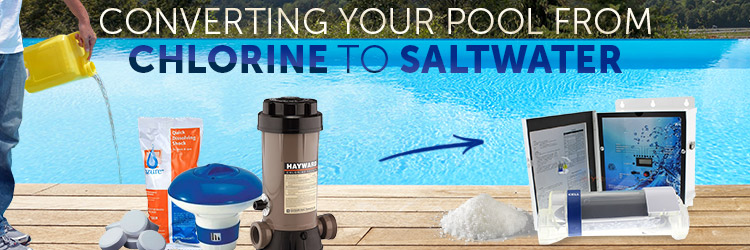
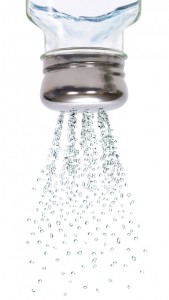

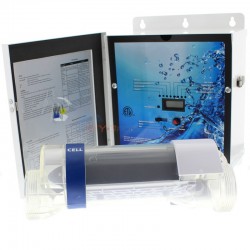
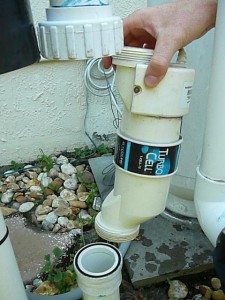
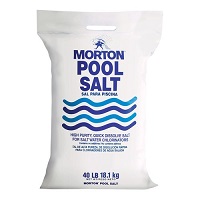
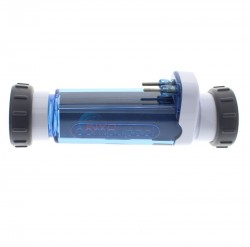
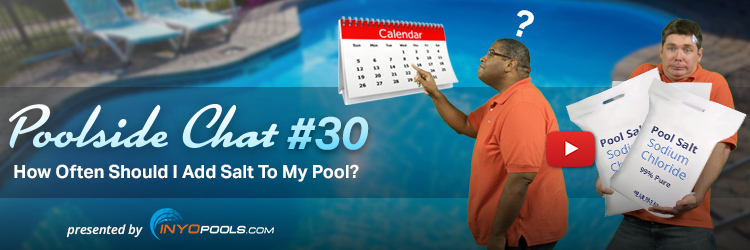
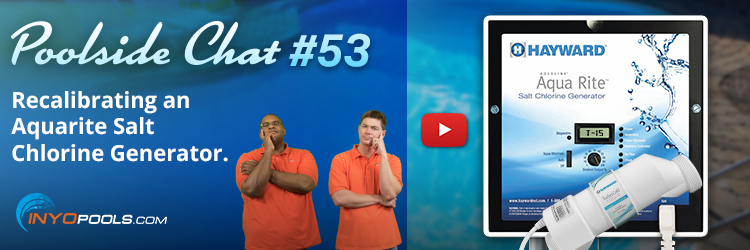

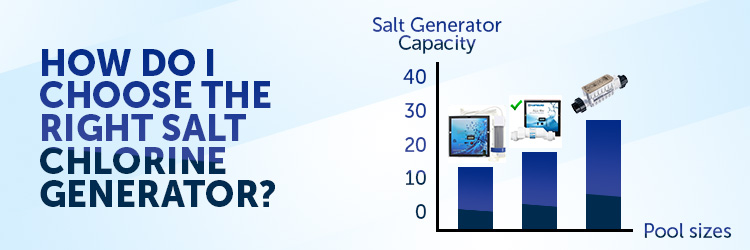






Hello Mathew,
I have been thinking about converting my one year old pool to saltwater. My pool in a 21′ round holds approximately 11,000 gallons. I have a filter pump, not a sand pump. What would you recommend for the chlorine generator? and the appropriate cost I saw this one on the WallMart web site: Intex 120V Krystal Clear Sand Filter Pump & Saltwater System CG-28679 with E.C.O. (Electrocatalytic Oxidation) do you think it will be Ok to work with my pool or would you recommend something different? much appreciated…
I am not that familiar with Intex pool equipment, I have heard good and bad things about their products. If I were you, I’d cruise the reviews over a few sites to determine if it quality or not. But if you are looking for a quality salt chlorine generator I suggest looking at the ChlorEase or AquaTrol units, both have proven to be solid. Of the two, I would go with the AquaTrol because the control box and the cell are one of the best you will find on an above ground salt generator.
Do you have plumbing parts for connecting an AquaTrol unit to the Intex pipes?
What size are the Intex pool pipes?
I have a vinyl liner pool. Can I convert to salt water? Also We live in upstate NY. what are the seasonal pool closing differences?
Yes, you can use a salt chlorine generator on a vinyl pool. Winterization can be as simple as removing the cell and installing in a dummy cell in the winter months.
hi Matt.
we are looking to convert our above ground pool.
will the pool deal with salt water as far as corrosion is concerned?
the current pump and filter are ok? it seems like they can be used
and the only thing I need is a chlorine generator.
if I were to get this model
http://www.inyopools.com/Products/02100023000354.htm
does that mean when the cells are dead, I have to by this entire unit again ?
it appears not.. it seems I can replace the cell but that is 500+?
i think my pool is about 5feet deep and 20 ft round.. is the Aquarite 40K – AQR15
overkill ?
thanks !
mike
Hi Matthew, on salt pools, do you use the same backwashing process? If so, this must be where you need to add salt? Backwashing is still needed I would imagine?
Yes, the same backwashing process would apply; salt would be added as necessary. The SCG’s control panel should give you the current salt readings to let you know when to up the salt.
Hello Matthew,
First, I have to say this is the best Q&A website I have ever seen. You are fantastic!
Question. I just converted to salt and the company did not educate me about how to care for the pool so I’m floundering here. Before I converted, I had a problem with the pool not registering chlorine and therefore, algae. I was told salt conversion would handle it. I have the AquaRite 940 on 3,600 output and I’m still getting algae. I used my test strips (haven’t had a chance to get the salt water type but figure it should read the same, no?) and still no chlorine is registering. I cleaned the pool, put the filter on and within an hour, there’s that sandy stuff back on the floor of the pool. Filter was cleaned last July and the pool is hardly used so I can’t image it is that. Any idea please on why algae is still forming? BTW, I live in New Jersey.
Thank you so much.
Angela, I apologize I thought I answered this question last week. So sorry!
Have you had the water tested by a local pool company? If so, please provide the readings for the Chlorine, pH, Total Alkalinity, and Hardness.
Do you have a sand, DE or cartridge filter?
Hi, Matthew,
We have a 26 year old gunnite pool and, due to some cracks, We’re having the gunnite cracks repaired, then a fiberglass spray over the the entire pool. I would appreciate your comments, positive or negative, on this type of resurfacing. Would this resurfacing affect conversion to the salt system at a later date?
Frankie
Matthew
I am considering switching to a Salt Water Pool. My pool is about 40 years old inground gunite 23,000 gallon pool.
Do I need to be concerned about the stainless steel filter or the underground plumbing (probably not PVC) that may be damaged after converting to salt water system?
Ron,
That is going to be rough, I suggest not switching unless you plan on replacing the filter and the pipes. There is always the addition of a Zinc Anode to prevent rusting but, to place it on the safe side I would stick with chlorine.
Matthew –
Do you mind sharing what kind of pool you have or would have , knowing what you know. And what would you assess is the annual cost of each – chlorine and salt – for a 20,000 pool in direct sun light in So Cal with a gray bottom > : {}
Without a doubt, I would use a salt chlorine generator over traditional chlorine. Pools are meant for fun and enjoyment, not fiddling with chemical test strips every other day. Salt make the chore of maintaining a pool a lot simpler for the average user, who may not be comfortable with the pool chemical gymnastics required when a traditional chlorine pool gets out of whack.
As for estimating total cost over the year, that is hard to say. The cost can range from 200-350 for traditional chlorine depending how long your season lasts. There is a useful operational cost calculators on HomeAdvisor.
Thank you for that feedback – much appreciate and appreciate all of the useful information you’ve provided throughout this blog stream.
Glad to help, have a nice weekend.
I’ve had both, currently have chlorine and REALLY miss the salt pool we used to have. Water chemistry was much easier to maintain, much more stable, didn’t have the peaks and valleys from week to week. Only had to add about 5 bags of salt over the course of the year. It was a 12,000 gallon pool. I really can’t wait to covert our current pool over. I’m experiencing the itchy/dry skin right now from the chlorine.
I do have a question, my DE filter says not for salt water system. A friend told me I just need to change my screens in the filter, what do you suggest? Thanks for a great article.
What is the make and model of your pool? Is it stainless steel?
In ground concrete pool. Not sure of finish, was built 9 years ago. All visible plumbing is pvc and none of the DE filter is stainless. Which is Pentair FNSP 36.
Hi, Matthew,
I have about a 20K gallon, in ground, fiberglass Chlorine pool that I’d like to convert to a salt system. If using a salt cell, Will I still have to use the same amount of algaecide, shock and other chemicals to control algae? Thanks.
Jem
If the cell is working properly, you do not need to add algaecide or shock regularly. As long as the cell is producing chlorine and you keep the pH, alkalinity and calcium hardness in check, algae will not stand a chance in your pool. The main chemical you will need is water conditioner. Most homeowners I have spoken with have seen a significant drop in their chemical budget.
The upfront cost of an SCG is more than setting up a chlorine pool but the reduction in maintenance time and chemicals makes up for it in the long run
I have the salt chlorinator install but I don’t have the electrical box set up for monitoring and controlling the chlorinator. I want to get the salt into the pool and start dissolving. what happens if I don’t get the chlorinator hooked up for a week after I have dumped the 10 bags of salt. Is it okay to keep swimming in the pool and will I just need to add more salt if I don’t have the 3,000 PPM. Won’t all the salt just eventually evaporate/go away and I would just need to add more salt once I have the chlorinator?
It is ok to swim in the salt water, but if your salt system is not operational you will need to sanitize your pool via chlorine tablets or liquid chlorine in the meantime. Salt does not evaporate from your pool, but will be lowered over time because swimmers take a little when they exit the pool, splash and from filter backwashing.
We are looking to purchase a home that has a 25,000 gallon in ground stainless side pool with a plaster bottom. It is currently chlorine but I have always felt salt water is better for my kiddos. The research I’ve done online says that the salt would not be good for plaster bottom? What do you know about that?
I am considering making the switch to salt water next season. Do I need to do anything special to prepare for the change when closing the pool this year?
Does a salt water pool require tile or is a vinyl liner OK?
Close your pool as usual; there is no special winterization procedure.
Salt water can be used in any of the common pool surfaces without a problem: i.e. tile, Pebbletec, vinyl, fiberglas, plaster or gunite.
To make the conversion chlorine to salt it’s necesary to drain the old water or i can switch to salt using the chlorine water
No need to drain, you will just add the salt and level the water chemistry as instructed in the guide.
Hi, we are thinking to convert the pool to salt water system. Could you please recommend any? I read the article the run from about 400 to 2,000 but could you please tell me what would be two or three you would consider to get if it was your pool ?? Thank you in advance for all the info and taking the time to answer!
The two salt chlorine generators that offer the best bang for your buck would be the Hayward AquaRite and the Pentair IntelliChlor. You really cannot go wrong by choosing either one of them. Use the guidance in this article or this one, How to Size a Salt Chlorine Generator for My Pool for help with sizing the generator for your pool.
Thank you so much I will use the guidance you provided!! Thanks again 🙂
I am setting up at 22′ x 52″ oval about ground pool. Would like to use the saltwater method instead of chlorine. I understand it means I need to purchase a new saltwater pump but do the hoses that came with the pool work with the saltwater pump as well as a chlorine pump? I am trying to figure out what I need to get to get a saltwater system up and running. Is there a good written source that would answer my questions.
The hoses that came with the pool should work just fine with either a chlorine or salt water application.
As for written guide on how to convert a pool to saltwater, look no further than the one we are commenting on currently. Read through the article, we provide links and guides on all the major steps for converting your pool.
Considering converting my salt pool back to chlorine tablets. What do I do with the 20,000 gallons of salt water? Also, Is it true that salt water damages the deck and coping over time? Thanks!
There is no need to purge the water; the salt will not affect the chlorine tablets. To switch from salt to standard chlorine, remove the salt cell and add in a tablet feeder; and, you’re done.
Salt can eat away at certain pool surfaces; that is why you should treat your deck with sealants or marine grade paints. For example: Deco Guard Plus
Thank you so much for this advice!
Would you recommend using something like a Hayward CL200 in-line or off-line, or something equivalent?
The Hayward CL200 or CL220 would work great, installation is pretty simple for either option. Another option to look at is the Rainbow Chlorinator Series.
Do you have a personal preference, chlorine generator or tablet feeder? I understand the CYA and PH maintenance implications of each. I currently have a generator and I’m just tired of replacing electronics and sensors, cleaning cells, etc. Looking for an easier option. Both seem to cost about the same. Would be nice not to feed my pool acid every week. Oh, then there’s the feeder available for that too…. where does it all end.
Hello Anonymous –
Would you mind sharing why you have decided to move back to a Chlorine pool from the Salt Water ?
We have a 14×42 coleman steel frame above ground pool and we want to convert to a salt water pool we purchased the intex salt water system and pump E.C.O. we hooked it up and the pump isnt working at all and it says low pump flow is it compatible for our pool
I’m not familiar with those Intex products, you may want to try the troubleshooting guide in their owner’s manual or contact the manufacturer.
If I switch to saltwater will I never have to backwash my filter? I definitely don’t want my landscaping and soil to be damaged by salt water.
The saltwater generation is just for chlorination; you will still need to clean your filter just as often as you would with standard chlorine. I suggest routing the backwash pipe to a drain away from any trees or soil to avoid salt buildup.
Hi. I’ve been reading your articles and watching your informational videos. I just want to say thank you very much for sharing all this useful information! We’re new to pool ownership, so it is very helpful!
Thank you, Sasha & Sonja! ?
My pool company has combined sources. I went to a salt water pool a couple years ago and LOVE it. The problem I’m having is my first pool company told me it would be better to switch to a DE filter system from a sand. Now the new company is telling me a sand system is better. Which is it
Filter choice is a combination of personal preference and the demands of your region. Sand is much easier to maintain than a DE filter, but the DE filter destroys sand in water clarity comparisons. Some people can swear they can tell the difference between the feel of a sand filter pool and a DE, but I myself can’t.
Regarding region, in places like Florida where algae outbreaks are common, we avoid sand because it has issues trapping dead algae. If you want a thorough explanation of the differences of filters, take a look here: Inground Pool Equipment Selection Part 2: Filters
But one is not better or worse for salt chlorine generators.
Hi Matthew,
We’re thinking of buying a home in South Florida which has an inground gunite pool. Not sure if it is chlorine or salt but assuming chlorine…can this type of pool (gunite inground) be safely converted to salt water system or am I just asking for trouble vis-a-vis disintegration of the pool by salt?
Yes, it is safe.
I have a 2000 gallon swim spa. I would like to convert it to a salt water sytem. What system would be best? And is this a good move on a swim spa?
Follow the sizing directions as specified in the article for finding the correct model.
Since this is a spa I presume, there is some sort of heating element in the system. If so you need to determine the metal of the heat exchanger or heating element; if it is copper, avoid going with salt because it will rot the metal. Only switch to salt if you have/or planning to chance to a cupro-nickel or another salt friendly metal.
I think it’s sad that people can’t take the time to read this article before posting a comment asking for help. If the answer is not right there in the article, it’s in the links posted. This is the most comprehensive article I’ve seen on the topic, and I appreciate the time it took to be so thorough. Thanks for the information, it answered all my questions because I took the time to read and watch.
Much appreciated!:)
I have an above ground pool that’s 16×32 15,000 gallons with a pump and filter what all do I need to transfer it to a salt water pool? Can you make a recommendation?
Read the blog.
Looking to see if there is any saltwater system that can be used for a 26′ Round ultra frame intex pool (approx. 15,000 gallons)? I purchased the Saltwater System from intex – model CS15110 and less than 2 years later, the pump is not working. (1 month after warranty expires) I have read review after review that everyone has issues with the intex saltwater system after 1-2 years and I really do not want to go back to that system. Is there a saltwater system that you would recommend for the intex pool that is not an intex brand? I feel like purchasing another intex system is like throwing money to the wind. I saw in prior comments that you suggested the Chlorease or the AquaTrol but haven’t seen very many good reviews on those either after 1 year use. I didn’t know if it is possible to use a more expensive saltwater system on the intex or not. I would not mind spending the extra money to get a good system because in the long run after spending $150 each year for a system, it would be worth it. Thanks for any info.
Brandy, there is always the option of installing an inground salt system on your pool; but, there arises the issue of plumbing. Inground salt systems are meant for PVC hard pipe and not the standard flex hose. If you wanted to go through the process of plumbing PVC, then I suggest the Pentair IntelliChlor or the Crystal Pure Salt System.